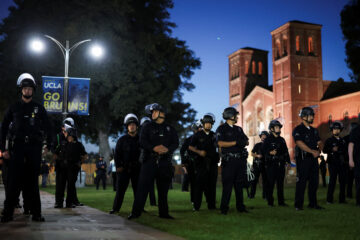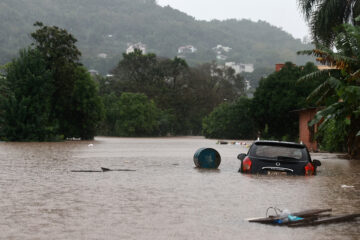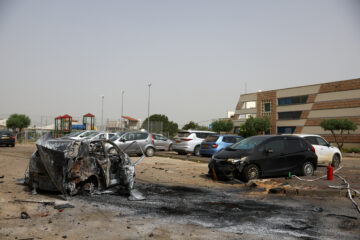Schools, shrines shut in Iraq’s Najaf over coronavirus
 The hospital in the Iraqi holy city of Najaf where the country's first novel coronavirus case is being treated (AFP Photo/Haidar HAMDANI)
The hospital in the Iraqi holy city of Najaf where the country's first novel coronavirus case is being treated (AFP Photo/Haidar HAMDANI)– Shrines have shuttered, streets are deserted and schools closed in Iraq’s holy city of Najaf, where only pharmacies draw crowds after a novel coronavirus case triggered widespread panic.
Najaf is popular among Shiite Muslim pilgrims from Iran, which has recorded 15 deaths from COVID-19, the highest death toll outside China, the epidemic’s epicentre.
It is also where Iraq confirmed its first novel coronavirus infection in an Iranian national studying in a Shiite seminary in the city, located around 200 kilometres (124 miles) from Baghdad.
Since he was diagnosed on Monday, authorities have beefed up precautionary measures.-
Thirteen students who attended the same seminary school as the patient are being checked for the virus, Najaf governor Louai al-Yasseri told AFP.
In an exceptionally rare move, religious officials on Tuesday closed down the Imam Ali mausoleum in Najaf, allowing visitors access only to its surroundings.
The mausoleum where the Prophet Mohammed’s son-in-law is buried is one of the holiest sites for Shiite Muslims and is frequented yearly by millions of pilgrims.
Visitors, including millions of Iranians, kiss and caress the tomb, making the area especially vulnerable to contamination.
Amid the growing alarm, students remained at home on Tuesday after schools and universities temporarily closed their doors.
“The 1,028 schools in Najaf province have closed following the detection of the first novel coronavirus case,” said a spokesman for the province’s education department.
The health ministry said this would remain the case for at least 10 days.
Najaf is home to the Wadi al-Salam (Valley of Peace) cemetery, the world’s largest, where millions of people from Iraq’s Shiite majority are buried.
The health ministry on Tuesday advised against non-essential travel to Najaf and urged citizens to refrain from holding large gatherings.
Inside the city, life has come to a stand-still, according an AFP correspondent.
The few that brave the streets seek out pharmacies to purchase disinfectants and medical masks which have become more expensive and increasingly difficult to find.
“There have been no masks for two days. How will I protect my children and my wife,” laments Hussam al-Khafaji, 29.
“Either there are no masks or they sell at four dollars,” nearly four times the price before the outbreak, he told AFP from outside a pharmacy in central Najaf.
With most people staying indoors, the main anti-government protest camp in Najaf was left nearly deserted.
Demonstrators, who had gathered there daily since rallies in the capital and the south began in October, refrained from protesting over fears of a coronavirus outbreak among their ranks.
SOURCE: AFP










